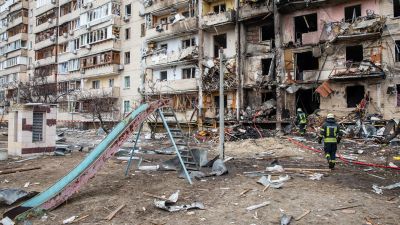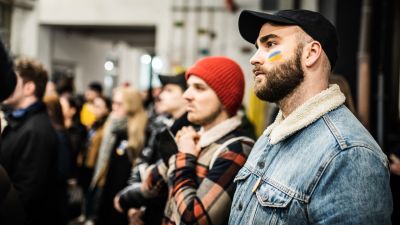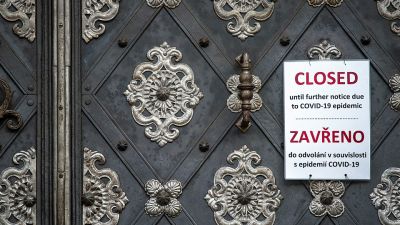“The Russian occupiers are destroying houses in my home town. They are dropping bombs on civilians,” says Tamara Bardina from Chernihiv, Ukraine, a student of the Catholic Theological Faculty at Charles University. “My people are being murdered,” she says, expressing horror and frustration. Tamara’s indignation and tears are in immediate response to the invasion on 24 February and the days that followed. Since, the situation in Ukraine has only grown worse, with each passing day.
Charles University is home to hundreds of Ukrainian students and academics [some 830 students, interns and trainees – ed. note]. Forum spoke with some of them from the Second Faculty of Medicine, the Hussite Theological Faculty and the Faculty of Law.
.jpg)
Chernihiv, considered one of the nicest cities in Ukraine, has become a battlefield. Photo by Tamara Bardina
Tamara continues: “At six in the morning on the Thursday she I received a message from her grandmother saying that war had begun: “I immediately called my parents to see if they were okay and wanted to come to the Czech Republic. They didn't want to. It's our country. Our home.”
Immediately after the Russian invasion began, Tamara started to organise humanitarian aid for her homeland. “I believe in the strength of my people. Today, more than ever, we need the help of the European Union, of the whole of Europe and of the Western world. The war that Russia has started is not only a war against my people, their freedom and their own existence. It is a declaration of war against the entire free world,” she explains.
A fifth year med student
Maryia Kalantay, a native of Kharkiv, is a fifth-year medical student at the Second Faculty of Medicine. “Words cannot express what I am experiencing. It is pain. My whole family is in the most affected cities. My parents stayed in Kharkiv. My cousin lives in Kiev, my uncle and grandmother are in the Sumy region...” the student confides.
As soon as the first information about the start of the Russian invasion was announced, Maryia was determined to return home.
“Then I realised that I would be of no use. My parents wouldn't even let me. I'm not even a doctor yet, I couldn't help anyone professionally. Not to mention the fact that I wouldn't have a chance to get to Kharkiv. A friend - a mother of a small child - called me and asked me if I knew of anyone who was leaving Kharkiv. She was looking for a place to save herself and her child.”
Maryia expressed determination to move her loved ones to the Czech Republic when she finishes medical school and is financially secure. “It's a bit difficult with my parents, they are both doctors, who have medical practices in Kharkiv.” Maryia says many people have offered to help her in recent days: “I have a lot of friends here. I know the parents of many of them. This gives me hope that I am not left here alone and completely destitute. They are willing to help me and my family. I have also received tremendous reassurance from my faculty and, in fact, from the entire Charles University. It gives me hope that I can handle everything. I confess I had a total breakdown [on the second day of the invasion]. I didn't know what to do. That's why I went to the study department. They were very kind and helpful and tried to calm my fears. As we are really small - almost a family faculty - we are much closer to each other,” she says.
Oksana and Olena Rizakova are sisters also studying at Charles University’s Faculty of Law. Both currently reside in Prague; Olena teaches Russian for lawyers at the Faculty of Education. “Our family lives in Uzhhorod, there is a lot of panic there. Relatives from other regions of Ukraine come to my parents' place to hide…”
Also from Uzhhorod, is Oleksandr Bilash, an associate professor at the Uzhhorod National University, who has been a visiting professor at the Hussite Theological Faculty of Charles University since 2019 (currently he is residing in Rome).
"Although the war in Ukraine has been going on for eight years [since the annexation of Crimea in 2014 and fighting against separatists in eastern Ukraine – ed. note] the news of Russia's treacherous attack on Ukraine shocked many, including me. Military action was constantly expected in the wake of the events of recent days. The bombings, rocket attacks and shelling of civilians in many Ukrainian cities such as Kiev, Odessa, Ivano-Frankivsk, Luck, Kharkiv, Melitopol, Podilsk and many others have only proved once again that the policy of appeasement of Russia was wrong and that agreements are irrelevant,” says Bilash, who is the Vice Dean at the Faculty of Law at Uzhhorod National University.
“History repeats itself, Cain kills Abel. Russia calls this war a ‘special military operation’ just as the Soviet Union in 1968 [played down its invasion that] tried to stamp out achievements of the Prague Spring with the Soviet boot,” he says.

President Volodymyr Zelenskyy at the front lines days before Putin launched his assault. Zelenskyy's bravery has inspired the world.
Associate Professor Bilash also stressed how important it was that fellow European countries as well as schools and institutions had taken proactive roles: “We are grateful to the Czech Republic for its active support of Ukraine. I would like to thank Rector Milena Králíčková and the entire leadership of Charles University for the rapid response of the university to the Russian military attack. I made no mistake when I started my doctoral studies at the famous Charles University.” The professor also had kind words for all of his colleagues from Charles University's Faculty of Humanities, headed by Dean Kamila Veverková, who contacted him immediately after the outbreak of fighting in Ukraine with an offer of help.
A former Erasmus+ student who studied in Ukraine
Three years ago, Ondřej Kadlec, a student of the Hussite Theological Faculty at CU, studied at Uzhhorod National University as part of the Erasmus+ programme. To this day he has many close friends from his time in Ukraine.
“I found out about Thursday's launch of the total invasion of Ukraine by the Russian Federation in the very early hours of the morning, when my phone started ringing almost continuously because my friends wanted to inform me about what was happening there. I immediately turned on the TV news from here and abroad, and started writing to friends and acquaintances in Uzhhorod and the surrounding area where I was staying.
“I am really worried about the Ukrainian people and about the preservation of peace in Europe and in the world. I was filled with deep anger and indignation. And this continues," Kadlec says. He adds that of those he knew in Ukraine, none had wanted this. Like the rest of the world, they had hoped that the Russian leader would not actually go through with an all-out assault.
“None of the people I knew in Ukraine wanted war from the beginning. Everyone hoped and still hopes that the fighting will not escalate any further and a solution to the conflict will be found in diplomatic talks and negotiations, because violent solutions to geopolitical conflicts do not belong in the 21st century.”
| For collegial counceling, accomodation, or assitance at faculties, please visit Charles University's webpages for help. You can find more information HERE. |




















